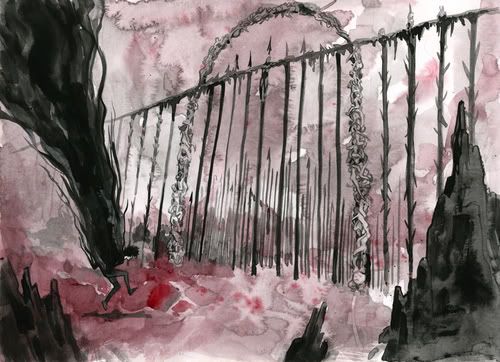
So this is the first issue where I had major problems, and I know you may not share my difficulties, but I'm going into them anyway. Perhaps I struggle with this because I don't believe there's a Hell, and the more I think about it, don't even have a conception of what Hell might look like.
It didn't bother me in Hell's previous appearance, back in Preludes and Nocturnes, because that introduced one domain among so many. In this issue, Hell is privileged as a place where all demons and evil beings go to roost.
Try as I might, I cannot see past this line: "there is only one that we have ever owned to be our superior. There is but one greater than us. And to him...to him we no longer speak." Unless Gaiman's about to pull something completely left-field on us, this implies the Abrahamic God. Indeed, Hell is sold to us as a real place, but the very conception only exists in Judeo-Christian religions. And not only does Lucifer state that this God is far greater than the Lord of Dreams, he erases any ambiguity by quoting biblical verse.
So it's a contradiction: Cain resides in the realm of stories, and yet God is real and makes proclamations about this fictional character.
Also, the list of names in panel one of the issue? All of the "many names" are Judeo-Christian realms apart from Tartarus. Hades is not a place of demons, it's a realm of the dead, and Avernus is merely an entrance.
Then, when Lucifer states that no greater percentage of the hedonist Cainites ended up in Hell than of any other religion, you realize that Gaiman has set up this illogical realm to make a bad joke about the Abrahamic God, basically that his rules don't make sense and intentionally obfuscate the truth of morality to his followers, and all religions are equally valid or invalid.
Then WHY does Gaiman state through Lucifer that the Abrahamic God as superior to the Endless? Certainly he doesn't declare Bast or Inana or any number of other Gods to be so. In fact, all the other Gods have power only as long as they exist in memory, which means that their stories are alive among mortals, which is to say they belong to the King of Stories, aka Morpheus. So then, perhaps Gaiman is saying that some stories, ie the Christian one, can become more powerful than the Endless themselves if enough people believe in them. In which case this conception of Hell sort of makes sense.
We are introduced to a number of other plot points in this issue: we learn that Lyta's baby has some significance to Morpheus, and that Morpheus has a predilection for dressing like a giant coral reef.
I apologize for the lengthy digression, but I think things are going to get really crazy, really soon.
And let's not forget who Hell really is for:

